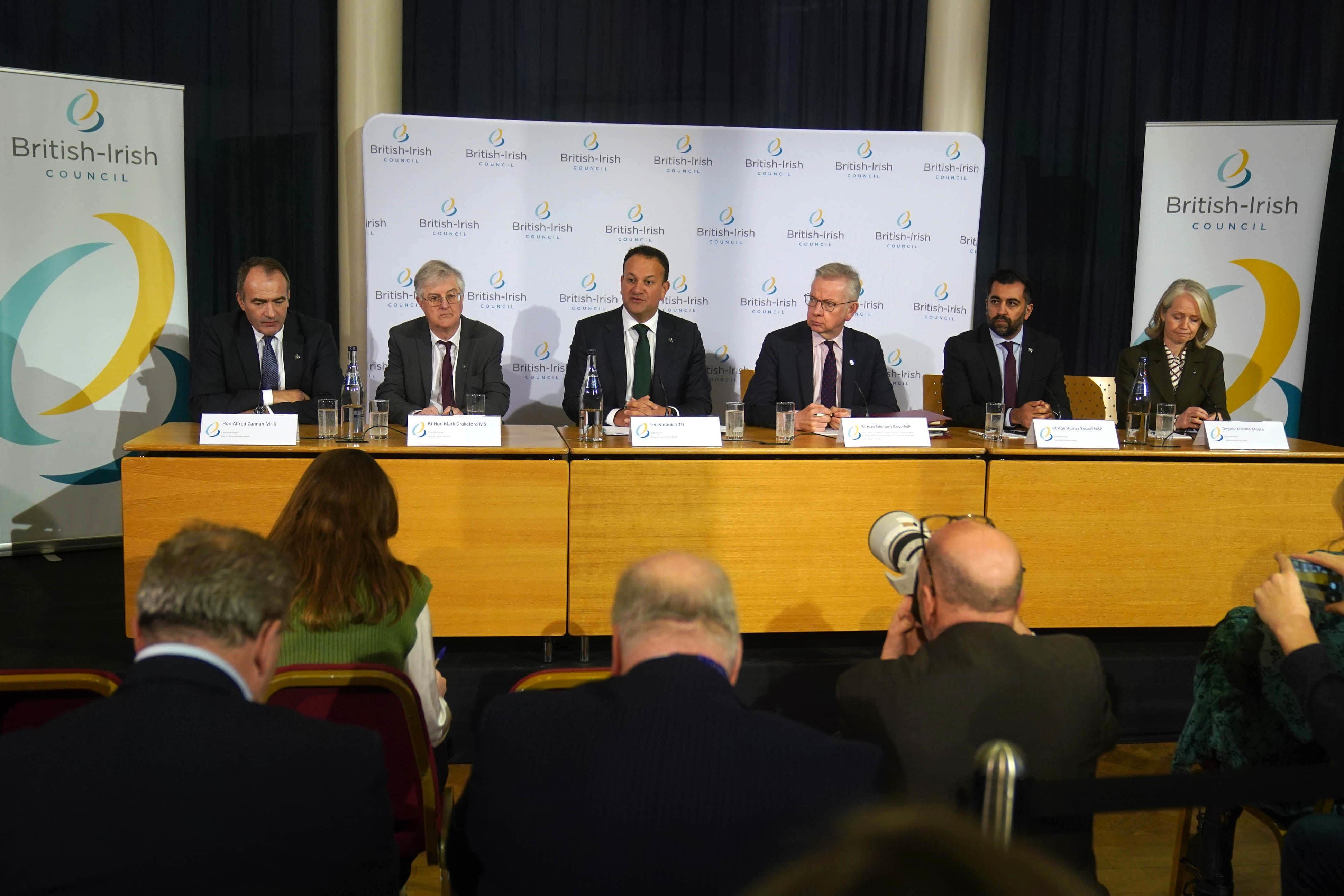Ever-decreasing number of issues in post-Brexit trade impasse – Heaton-Harris
Politicians gathered at Dublin Castle for a meeting of the British-Irish Council.

There is an “ever-decreasing” number of questions to be answered in negotiations between the UK Government and the DUP over post-Brexit trading concerns, Chris Heaton-Harris has said.
The Northern Ireland Secretary repeated his belief that the talks were in their final stages and there had to be an end to the process.
Meanwhile, Ireland’s premier Leo Varadkar said there is no deadline for the restoration of the Stormont Assembly, but he believed resurrecting it before Christmas “would be the best outcome for everyone”.
British and Irish politicians gathered in Dublin for a meeting of the British-Irish Council.
However, the Northern Ireland Assembly was not represented due to the ongoing powersharing stalemate.
The DUP has been blocking powersharing at Stormont for more than a year and a half in protest at the internal UK trade barriers created by Brexit’s Northern Ireland Protocol.
The unionist party has been involved in negotiations with the Government about the Windsor Framework, which reformed the protocol and is seeking further assurances, by way of legislation, over Northern Ireland’s place in the UK internal market.
Speaking to the media in Dublin, Mr Heaton-Harris said both sides “are in the final stages of these talks and there is progress being made”.
He added: “The talks with the DUP are the gift that keeps on giving so maybe Christmas is something to talk about. I want to bring them to a conclusion as quickly as I possibly can but it is not just in my hands here.
“We are genuinely making progress, there are genuine points that the DUP have raised, some I need to answer, some I believe have genuinely been answered.
“But there will be an actual end to this process because it is not a limitless amount of questions that can be asked.”
Mr Heaton-Harris said there was no sense of drift in the process and the negotiations were in a “very different space” than six months ago.
I want to get the Executive up and running as soon as possible, if I could have been able to achieve that six months ago I promise you I would have
He added: “However, these talks can only come to an end when both sides feel they are in a successful place to conclude.
“I want to get the Executive up and running as soon as possible, if I could have been able to achieve that six months ago I promise you I would have.”
He said Northern Ireland was diverging from the rest of the UK in health and education outcomes because of the lack of a Stormont Executive.
He added: “There is an ever-decreasing list of questions that we are circling on.”
Mr Varadkar said he was almost afraid to be optimistic because there had been a number of “false dawns”.
He added: “I think it is fair to say the UK Government is working very hard with the DUP in particular, but also consulting other parties and us about mechanisms by which we could have the Assembly and Executive functioning again, we all want that to happen.
“There’s a lot of issues happening in Northern Ireland which need to be dealt with, which require a devolved administration.”
If we’re able to get things on track in the next few weeks for Christmas, that would be the best outcome for everyone
The Taoiseach added: “There isn’t a set deadline, and it’s not for me, nor would it be helpful for me, to try to impose any sort of deadline on when the talks will be completed.
“But there are natural points in the process that are just there, for example, I think it’s around mid-January a decision would have to be made not to trigger elections.
“So there will come a point where if talks aren’t successful, that decisions have to be made and legislation is then required in Westminster.
“I’d hope it doesn’t get to that decision point, and if we’re able to get things on track in the next few weeks for Christmas, that would be the best outcome for everyone, I think.”
Mr Varadkar added that it is important that devolved government is restored in a sustainable way, to avoid future collapses.
Secretary of State for Levelling Up Michael Gove said all those at the British-Irish Council lamented the continued collapse of devolved government in Northern Ireland.
“We are keen to ensure that the institutions are back up and running, delivering for people in Northern Ireland, and that they’re reconstituted on a sound and sustainable basis,” he said.
Bookmark popover
Removed from bookmarks